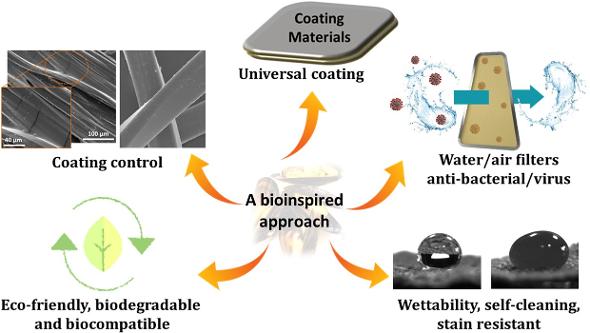International Partner Search
Innovation & Technology Offer
Mussel-bioinspired polymers as multifunctional coatings
Country of Origin: Spain
Reference Number: TOES20211019001
Publication Date: 19 October 2021
Summary
A Catalan (Spanish) nanoscience and nanotechnology research centre, has developed a versatile and biocompatible family of mussel-bioinspired polymers with production procedures easy to scale-up, that can be applied as universal coatings, functionalized and applied in different areas, such as anti-bacterial, anti-corrosive or particle entrapment. Partners interested in research collaboration are sought.
Description
The Catalan (Spanish) research centre is a non-profit global leader organization, focused on the newly-discovered physical and chemical properties that arise from the behaviour of matter at the nanoscale.
Surface coatings are one of the industrial areas with the greatest impact due to their wide use in different sectors (paper, food, construction, automotive, naval, etc.). Currently many systems allow effective coating for specific needs. However, on many occasions, the coatings used have significant limitations, making their final application difficult. For this reason, the search for new coatings with active and smart properties has become a necessity. Requirements are increasingly specific and in line with critical economic and environmental needs. In general, functional surface coatings must be more robust, resistant, biodegradable and provide more than one property or function depending on its final application. This can be achieved with bioinspired coatings based on catechol molecules, allowing for the formation of a versatile and universal coating for almost any type of surface.
In the literature, different coating technologies can be found (inorganic coatings, biofilms, etc.). Usually, each coating must be applied for specific surfaces, depending on the final application. The technology developed by the research centre is classified in the area of organic coatings and the differential point lies in the formation of versatile and universal coatings based on catechols, which are natural compounds.
Through their approach, which is an eco-friendly (produced under mild conditions) and straightforward procedure (single step synthesis), they are able to produce different bioinspired coatings with different chemical compositions and properties. These coatings can be applied to any type of surface (e.g., metals, paper, wood and glass, among others), showing strong adherence to the coated surface. Besides, thanks to their chemical composition, the coatings can be functionalized on demand with different (bio)molecules of interest. For example, they can be functionalized with anti-bacterial or anti-viral compounds for their application in filters for water treatment or air filtration. Thanks to the adhesion properties of the coating, the bacteria or viruses could be entrapped and deactivated. Furthermore, other tribology properties can be modulated as, for example, wettability or roughness. The wettability of the resulting coated surfaces can be modulated between hydrophilic or hydrophobic character depending on the final application. For example, it is also possible to prepare bioinspired coatings able to absorb oil from an eventual spill in water. Interestingly, the developed bioinspired coatings have shown biocompatibility and biodegradability, thus avoiding environmental, and ecosystem contamination.
Taking into account the features of their technology, the application fields of the coatings are mainly focused on two areas:
1) Environment: water and air filtration, water harvesting, CO2 capture, paper industry, agriculture and reduction of plastic use, among others
and
2) Health: coating of prosthesis, devices, surgical tools or healthy products.
The research centre is interested in performing with companies proof-of-concept studies to validate the technology for specific applications under research collaboration. The research centre has the knowledge and facilities, including chemical laboratories, physicochemical and biological characterization equipment and laboratories for in vitro tests. In addition, it is possible to perform pilot scalability of the product in its own facilities.

Advantages and Innovations
- Adhesion in humid and underwater conditions
- Easy to scale-up
- Functionalization with (bio)molecules
- Thickness control by modulating reaction conditions
- Biocompatible and biodegradable
- Universal to different type of substrates (wood, paper, metals, fabric, etc.)
- Long durability
- Easy to functionalize with different (bio)molecules (antibacterial moieties, fluorescent dyes, hydrophobic agents, etc.)
Stage Of Development
Prototype available for demonstration
Stage Of Development Comment
The research centre has developed a family of coatings with strong adherence to different type of substrates (wood, fabric, metals, paper, polypropylene-based materials, etc.). Besides, the coatings have been successfully functionalized with different (bio)molecules of interest in order to modulate the final properties of the coated surface, such as the wettability, charge, antibacterial capacity, fluorescence, etc. The coatings have been tested in order to determine their durability and robustness, showing long stability even in water environments. Worth to mention, the biocompatibility of the coatings has been tested in vitro in order to corroborate their low impact in biological environments.
Requested partner
The research centre is looking for companies from the health, agriculture, water purification and paper sectors, among others, interested in leading proof of concept studies to test and validate the technology for specific applications in relevant environmental conditions under a research cooperation agreement.
Contact Profile Owner
